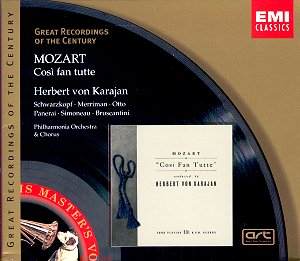Now here is a recording that really deserves the label
‘Great’. Originally issued on Columbia 33CX1262-4 in 1955, it seems
for some reason to have been overshadowed by Böhm’s 1963 version,
also with the Philharmonia Chorus and Orchestra and also produced by
Walter Legge (HMV SLS5028: Schwarzkopf again took the role of Fiordiligi).
The present reissue, therefore, comes as a reminder of the strengths
of the early Karajan, who was yet to descend into self-indulgence. Richard
Osborne’s informed and perceptive notes inform the reader that the répetiteur
for these sessions was none other than Reginald Goodall.
Do not let the mono recording put you off: it is warm
and detailed and lets through a multitude of delights. Karajan had under
him a superb instrument, the Philharmonia, boasting soloists of the
calibre of Sidney Sutcliffe (oboe), Bernard Walton (clarinet) and, of
course, the inimitable Dennis Brain on horn. Mention of Sutcliffe is
particularly poignant at this time: this superb oboist sadly passed
away on July 5th, 2001.
The vocal soloists are perfectly chosen and every word
of the libretto is given its rightful place. They really work together
as a team, and the pacing is such that once one starts listening, it
is difficult to stop. For once, the recitatives on disc are a constant
pleasure rather than a chore to sit through as one waits for the next
aria or ensemble to begin. They positively sparkle and are integral
to the experience (the idea of a highlights disc stemming from this
account seems positively sacrilegious!). It is probably the sense of
fun, and a real impression of being in the theatre that distinguishes
this reading.
The overture sets the orchestral standard that the
Philharmonia keep until the very last note. Textures are light, the
tempo is flowing and the wind solos are breathtaking. String articulation
is clear and bursting with life. Of the soloists, it is Lisa Otto’s
Despina that calls for the first comment. Her ‘Una donna a quindici
anni’ is light, stylish and superbly coquettish, and as a bonus she
is a mistress of the art of disguise: listen to her ‘Notary’ on the
final disc (which, incidentally, is short measure at 38’17). Schwarzkopf
is on tremendous form as Fiordiligi. Her ‘Per pièta, ben mio,
perdona’ is a true highlight. She pitches the large intervals perfectly,
but is nearly upstaged (unlikely though it may sound) by the stunning
horn playing. Her Dorabella, Nan Merriman, is the perfect vocal match
not only for Schwarzkopf but also for Panerai’s Guglielmo (try ‘Il core
vi dono’ as evidence of this). Merriman gives a dramatic portrayal,
too, but within Mozartian limits: her ‘Ah, scostati! … Smanie implacabili
che m’agitate’ is superbly done, without suffering from over-vibrato.
Sesto Bruscantini is cynicism personified as Don Alfonso.
The sense of theatre that runs through the entire performance
is this Così’s distinguishing feature. Karajan’s tempi
almost always feel natural and as if they could not be otherwise. There
are only occasional quibbles, but they are almost irrelevant: perhaps
the chorus ‘Bella vita militar!’ could be livelier, for example. The
Philharmonia convey the atmospheres of the arias, ensembles and choruses
with true finesse. Panerai’s Guglielmo is consistently outstanding (listen
to his contributions to ‘Sento, oddio, che questo piede’) and the slight
edge to his voice is entirely convincing (try ‘Non siatte ritrosi’ as
evidence of this). Simoneau is, as ever, the very definition of style:
he shades his aria, ‘Un’aura amorosa del nostro tesoro’ quite exquisitely.
This set surely represents the bright, busy epitome
of comic opera. It is pure joy from beginning to end and will be making
many return visits to my player.
Colin Clarke

![]() Elisabeth Schwarzkopf (soprano)
Fiordiligi; Nan Merriman (mezzo) Dorabella; Lisa Otto (soprano) Despina;
Léopold Simoneau (tenor) Ferrando; Rolando Panerai (baritone) Guglielmo;
Sesto Bruscantini (baritone) Don Alfonso; Philharmonia Chorus and Orchestra/Herbert
von Karajan.
Elisabeth Schwarzkopf (soprano)
Fiordiligi; Nan Merriman (mezzo) Dorabella; Lisa Otto (soprano) Despina;
Léopold Simoneau (tenor) Ferrando; Rolando Panerai (baritone) Guglielmo;
Sesto Bruscantini (baritone) Don Alfonso; Philharmonia Chorus and Orchestra/Herbert
von Karajan. ![]() EMI GREAT RECORDINGS
OF THE CENTURY CMS5 67064-2 [161.00]
EMI GREAT RECORDINGS
OF THE CENTURY CMS5 67064-2 [161.00]